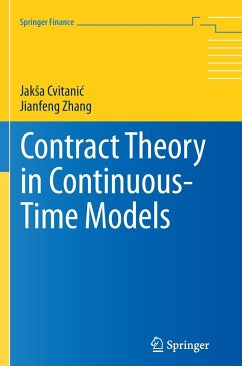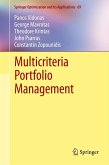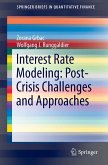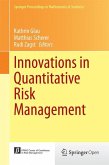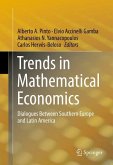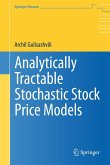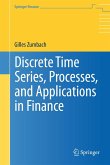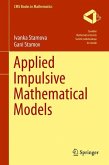In recent years there has been a significant increase of interest in continuous-time Principal-Agent models, or contract theory, and their applications. Continuous-time models provide a powerful and elegant framework for solving stochastic optimization problems of finding the optimal contracts between two parties, under various assumptions on the information they have access to, and the effect they have on the underlying "profit/loss" values. This monograph surveys recent results of the theory in a systematic way, using the approach of the so-called Stochastic Maximum Principle, in models driven by Brownian Motion.
Optimal contracts are characterized via a system of Forward-Backward Stochastic Differential Equations. In a number of interesting special cases these can be solved explicitly, enabling derivation of many qualitative economic conclusions.
Optimal contracts are characterized via a system of Forward-Backward Stochastic Differential Equations. In a number of interesting special cases these can be solved explicitly, enabling derivation of many qualitative economic conclusions.
"The book under review provides a complete treatment of the principal-agent problem that covers all cases treated in economic literature ... . It is the first of its kind in that it provides a fully developed mathematical framework addressing the principal-agent problem with complete proofs and explanations of all mathematical tools used therein. ... The introduction of this book is accessible to a general audience." (Olympia Hadjiliadis, Bulletin of the American Mathematical Society, Vol. 52 (3), July, 2015)
"The present book presents a nice exposition of the theory of the stochastic maximum principle, starting with BSDEs, and of its applications to contract theory. ... I recommend it to anyone working on or teaching the mathematical aspects of contract theory and/or stochastic control." (Etienne Pardoux, SIAM Review, Vol. 57 (2), June, 2015)
"This book considers contract theory in continuous time. ... This book is a good reference book for researchers and graduatestudents in economic theory, finance and mathematical economics. Continuous-time contract theory is particularly useful in finance. This book provides a basic methodological framework, which can be used to develop further advances, both in applications and in theory." (Susheng Wang, Mathematical Reviews, August, 2013)
"The present book presents a nice exposition of the theory of the stochastic maximum principle, starting with BSDEs, and of its applications to contract theory. ... I recommend it to anyone working on or teaching the mathematical aspects of contract theory and/or stochastic control." (Etienne Pardoux, SIAM Review, Vol. 57 (2), June, 2015)
"This book considers contract theory in continuous time. ... This book is a good reference book for researchers and graduatestudents in economic theory, finance and mathematical economics. Continuous-time contract theory is particularly useful in finance. This book provides a basic methodological framework, which can be used to develop further advances, both in applications and in theory." (Susheng Wang, Mathematical Reviews, August, 2013)
From the reviews:
"This book considers contract theory in continuous time. ... This book is a good reference book for researchers and graduate students in economic theory, finance and mathematical economics. Continuous-time contract theory is particularly useful in finance. This book provides a basic methodological framework, which can be used to develop further advances, both in applications and in theory." -- Susheng Wang, Mathematical Reviews, August, 2013
"This book considers contract theory in continuous time. ... This book is a good reference book for researchers and graduate students in economic theory, finance and mathematical economics. Continuous-time contract theory is particularly useful in finance. This book provides a basic methodological framework, which can be used to develop further advances, both in applications and in theory." -- Susheng Wang, Mathematical Reviews, August, 2013

